Is The Trade Deal The Real Deal?
One of the peculiarities of the recent stock market rally is that the media and many investors have been perpetrating a confused idea of what’s driving the rally.
With economic growth decelerating in basically all the countries that provide reliable data (China not on the list), and important leading indicators such as manufacturing PMI signaling recession levels in more than half of the countries, we can be sure that better economic prospects are surely not behind the recent rally. At least if you don’t consider this thesis that markets are rallying on increased optimism around trade negotiations.
By observing the market’s action in the past months it’s clear to me that this rally is not driven by better fundamental prospects. If better economic expectations were actually driving the rally, then we could not explain how leading indicators such as manufacturing PMIs in all developed economies are still trending so negatively.
Germany is an example:
(Click on image to enlarge)
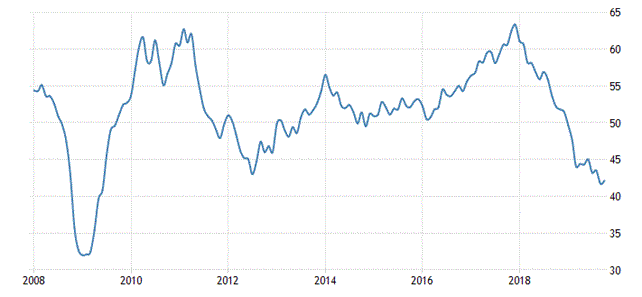
Manufacturing PMI, Germany. Source: Trading Economics
Japan is another example:
(Click on image to enlarge)
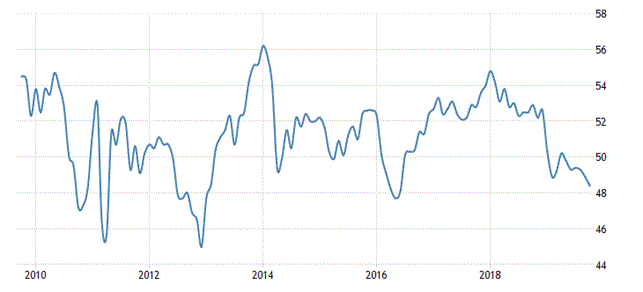
Manufacturing PMI, Japan. Source: Trading Economics
The United States also doesn’t show so positive trends.
(Click on image to enlarge)
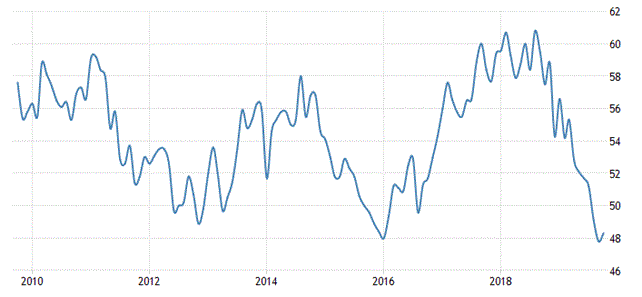
Manufacturing PMI, United States. Source: Trading Economics
However, low business confidence is what really makes me skeptical. The reason is simple. As a purchasing manager, I would find it convenient to wait for a trade resolution before committing capital spending, as this would allow me to save a lot by avoiding paying tariffs that will be lifted. This could explain why Manufacturing PMIs fail to improve. However, positive expectations should also translate into increased business confidence, which should be a clear result of expectations of improving global trade.
This is not exactly what I see. Business confidence in the United States, as measured by the Nfib Business Optimism Index is still at positive levels but well below the highs and currently very close to the three-year lows:
(Click on image to enlarge)
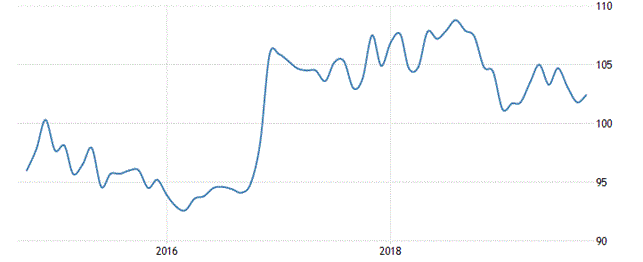
Nfib Business Optimism Index. Source: Trading Economics
In Germany, business confidence is at levels not seen since the euro crisis.
(Click on image to enlarge)
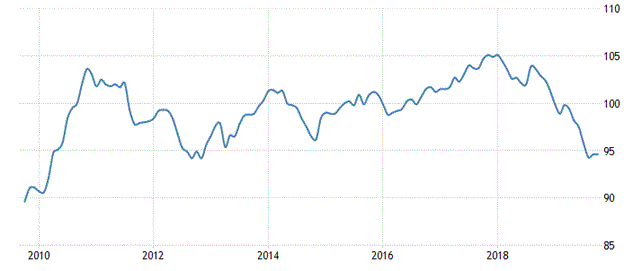
Business Confidence, Germany. Source: Trading Economics
Japan is somewhat in the middle, with business confidence at 6-year lows.
(Click on image to enlarge)
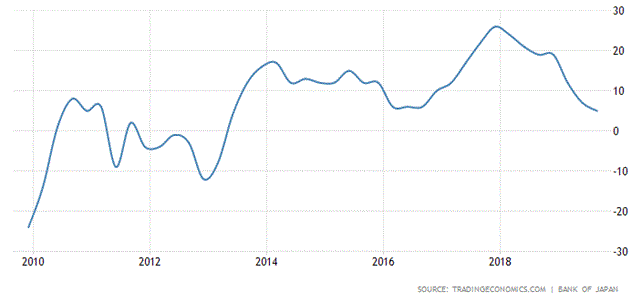
If prospects for positive developments in trade talks were the real driver of the recent rally, I think we should have seen a much better reaction in terms of business confidence.
Besides this divergence, I think it’s worth going deeper and analyzing whether it’s true that prospects for a trade resolution are actually driving increasing expectations. It makes sense to look inside the stock market.
If prospects of a trade deal were a real thing, I would expect companies more exposed to global trade, especially with China, to perform best. However, some data from Bloomberg Intelligence in a piece published recently shows that the best performers in the S&P 500 since the August low have been the stocks of companies with foreign sales between 10% and 20% while the companies with 70% average sales overseas underperformed this group by 230bps.
(Click on image to enlarge)
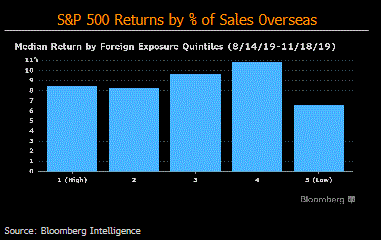
Moreover, the piece points out that domestic companies have outperformed multinationals by a median of 130bps.
The piece also mentions that while companies with sales to China have outperformed, those with imports from China have underperformed domestic rivals.
It’s clear that the market is rallying on news of trade optimism. We can see this every day. Most of this news is just noise without any substance. However, the market keeps rising on every piece of news mentioning progress on the front of trade negotiations. If the data from Bloomberg intelligence is accurate, the analysis of the inside of the stock market shows that these trade deal rumors have very little value to smart investors who really buy fundamental improvements. If that was the case, the stocks with exposure to China or to global trade, in general, would show a clear outperformance vs. the others. Instead, it seems that this rally is being driven more by unconditional buying after news headlines than by fundamental improvements.



